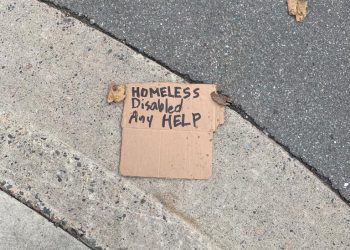The Common Front for Social Justice has released its assessment of where the province stands in its fight against poverty. While some measures indicate small steps in the right direction, Linda McCaustlin, co-chair of the Common Front for Social Justice says there is still much to be done if all New Brunswickers are to have a decent standard of living.
The good
The Common Front gave qualified praise for the two increases to the minimum wage implemented by the Graham government in the last year, while noting that this still does not bring the wage up to the Atlantic average. It is expected that this will change in the coming year.
Thumbs up also go to the adoption of the Pay Equity Act. This requires all public sector employers to determine whether sex discrimination in compensation exists among employees who are performing work of equal or comparable value. If discrimination is found to exist, the employer must raise the pay for work traditionally done by women to the level paid for comparable work traditionally done by men. There is still no sign of pay equity legislation for the private sector however.
The Common Front also welcomes the Alward government’s announcement of a new $100 Home Energy Assistance Program to help low income New Brunswickers pay their heating bills.
The bad
The Common Front says that many in the business community have pressured the government to cancel planned increases to the minimum wage. Some have even gone so far as to suggest the creation of a two-tier minimum wage.
In addition, New Brunswick had the lowest annual welfare income for disabled persons as well as for couples with two children. The only category in which the province was not ranked last was for single parents with one child. In this category, New Brunswick ranked tenth out of thirteen. McCaustlin says that thousands of people living on social assistance receive inadequate government support, this on top of increasing food prices. She notes that while the percentage of income spent on food by an average Canadian household is 10.4%, people living on limited means spend a lot more. For New Brunswick households it can range between 15.3% and 50.6%.
New Brunswick has also seen the numbers of people accessing food banks increase for two years in a row. 2008-2009 saw a 14% increase, while 2010 saw an increase of 4%.
The ugly
The Common Front says that in October 2010, the government changed the process of mailing out the $1,000 lump sums to persons with disabilities, opting instead to mail out a monthly allocation of $83.33. Because of this change, McCaustlin says that by December 2010, persons with disabilities had only received $250, namely their allocations for October, November and December. “They are missing the balance of $750 because they have not received their allowance for the other nine months completing the yearly cycle,” she says.
The Graham government increased the basic rates for people on welfare by 2% between 2006 and 2008, but cancelled this modest increase for 2009 and 2010. McCaustlin says that this decision effectively steals from the poor.
She notes that while the 2% welfare increase was cancelled, the budget for the implementation of the Poverty Reduction Plan was announced at $3.5 million each year for five years. Dividing this figure by the number of caseloads (around 25,000) yields $140 per case, which corresponds to an increase of around 2% for each household on social welfare.
“It’s criminal that Shawn Graham’s government used this money to set up an administrative structure rather than increase help to 40,363 citizens who depend on social welfare to better feed, clothe and house themselves,” says McCaustlin.
The Common Front for Social Justice hopes that the new government will take a better approach to helping people living in poverty. It calls on the Alward government to increase the basic welfare rates to the Atlantic provincial average at minimum, reimburse the $750 to all who lost it, increase the minimum wage and implement pay equity legislation for the private sector.



![How accessible are Moncton and Dieppe for people with disabilities? [video]](https://nbmediacoop.org/wp-content/uploads/2025/07/WheelchairAccessMay820252-350x250.jpg)
![‘Panic attacks’ as retail workers forced to deal with surge in shoplifting [video]](https://nbmediacoop.org/wp-content/uploads/2025/04/RetailDelSaltoApr92025-1-350x250.jpg)



![New Brunswick prof travelling to Egypt-Gaza border to call for end of blockade [video]](https://nbmediacoop.org/wp-content/uploads/2025/05/shutterstock_2576513645-120x86.jpg)

